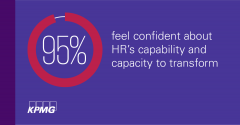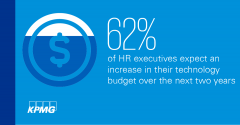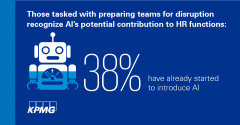Digital Transformation Drives UAE’s HR Sector As The Function Becomes More Strategic, KPMG Lower Gulf Report Finds
It appears that the role of the HR function is becoming more critical in the UAE. According to KPMG Lower Gulf’s The future of HR 2019 report, almost 80 per cent of UAE-based HR executives believe that the function is a key value driver for senior leadership, as it contributes to performance management, workforce reskilling and business transformation. This year’s report focuses on understanding how the convergence of policy, technology and innovation in the UAE is driving digital transformation.
A majority of executives interviewed (90 per cent) stated that their enterprises have invested in one or more digital solutions over the past two years, with 62 per cent expecting an increase in technology budgets by 2021. Implementation of digitally-driven HR innovations is led by automation of payroll systems and/or vendors (62 per cent), adoption of Human Capital Management (HCM) software (55 per cent) and use of mobile HR applications (40 per cent).
Marketa Simkova, Head of People and Change, KPMG Lower Gulf, said: “The HR function appears to have evolved to occupy a far more strategic role for organizations in the UAE, and senior leadership teams are now looking at new ways to drive business and operational performance by investing in digital tools and solutions, including Artificial Intelligence (AI) and machine learning. As the UAE continues to invest in building a knowledge-based economy, a combination of a skilled workforce and suitable corporate culture will be fundamental to enable successful transformation.”
Since implementation of AI is still in its early stages, the survey suggests that this may be the ideal time for HR not to simply manage disruption but to also proactively shape the workforce and instill confidence in the organization. In fact, nine out of ten (88 per cent) HR leaders in the UAE and 83 per cent globally feel that HR can bring tremendous value through analytics, enabled by technologies such as AI.
The survey also identifies capabilities vital to the successful development of related functions in this era of technological disruption. These include a modern problem solving framework that promotes collaboration, diversity of thought, visual expression and results in a shared vision and sense of ownership; leveraging data analytics to accurately predict business needs and individuals’ behavior and enable efficient decision making; and leveraging innovation to realize unique capabilities and potentially rethink how business is done.











 Email: info@cyber-gear.com
Email: info@cyber-gear.com